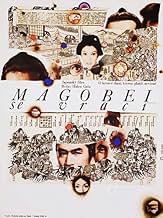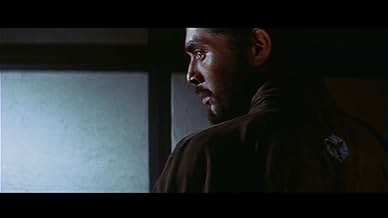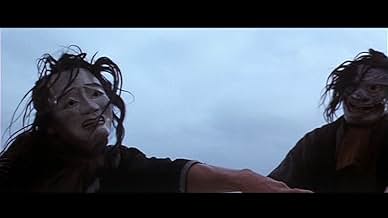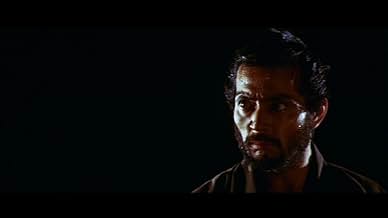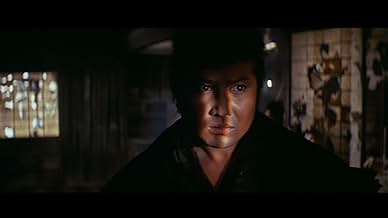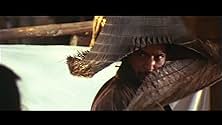AVALIAÇÃO DA IMDb
7,6/10
2,8 mil
SUA AVALIAÇÃO
Adicionar um enredo no seu idiomaA guilt-haunted samurai warrior attempts to prevent a massacre from taking place.A guilt-haunted samurai warrior attempts to prevent a massacre from taking place.A guilt-haunted samurai warrior attempts to prevent a massacre from taking place.
- Prêmios
- 2 vitórias e 1 indicação no total
- Direção
- Roteiristas
- Elenco e equipe completos
- Produção, bilheteria e muito mais no IMDbPro
Avaliações em destaque
Goyokin is one of those movies that I wanna scream from the rooftops just how incredibly awesome they are. The kind of film I wanna grab every person I know by the neck and force them to watch it with eyes wide open, Clockwork Orange style. It's really a cinematic crime that Goyokin is not as widely seen and regarded as the works of more famous Japanese directors, like Kurosawa. It might be a genre movie and as such attract mostly chambara fans, but this really deserves to reach more mainstream audiences. Put simply, if you like beautiful movies, you have to see this one.
The plot concerns a clan that is struggling financially who schemes to steal a shipment of the Shogun's gold and silence the nearby villagers who witness the crime and the ronin Magobei (played by the unparalleled Tatsuya Nakadai) who makes a moral stand and decides to go against his former clan. I won't go too far into plot details, but let's just say Goyokin is an anti-samurai film at heart. Like the best work of that other great jidai-geki director, Masai Kobayashi, Hideo Gosha doesn't try to pass moral judgement on his characters and treats them with compassion and affection. We're in 1830 and these are hard times for samurais as Japan finds herself on the brink of change. As one character realises in the end, "We sit here and die in the cold, and what does the Shogunate do? They get fatter in the heat". Gosha doesn't condemn the samurais for their soon to be obsolete code, rather puts things into perspective and shows us that desperate people will do desperate things. Innocent people die but who is really responsible for these crimes? It plays out like a good ancient Greek tradegy, minus the melodrama. Every emotion is incredibly nuanced here, every glance, move and frame. Gosha wisely lets the visuals tell the story.
And that brings me to the next point. The visuals. I am not exaggerating when I say that Goyokin is one of the most beautiful movies ever conceived. Yes better than most Kurosawa films, if the comparison has any merit. The colours are like small strokes of a brush on a white canvas as most of the film was shot outdoors in snowy landscapes. The rugged terrain is a pivotal character here, from the stormy sea to the blizzards to the open vistas. The cinematography and the way Gosha treats the locations as an integral part of every scene, reminded me of the spaghetti westerns of the great Sergio Corbucci (Django, The Great Silence). The muddy streets of a small town (as in Django). The snow blizzards and the cold, hostile terrain (as in The Great Silence). Samurais trying to prevent frostbite from setting in before a duel, unable to pick up their swords and fight. That nature is so tightly interwoven to the plot is another testament to Gosha's attention to detail. His cinematography is truly outstanding. I simply can't stress how visually awe-inspiring this movie is. Every frame is a painting. In a way it brought to mind the maestro Sergio Leone. After all the jidai-geki and the spaghetti western are very similar in the ways they depict their scarred heroes, the duel and the terrain.
I don't know what else to say about Goyokin. The performances are great all around with Ruriko Asaoka stealing every scene she's in, not least thanks to her drop dead gorgeous looks. Tatsuya Nakadai is once again outstanding in the lead role. The swordplay is fantastic, quick and brutal thrusts of the sword with an emphasis on the ritualistic aspect of the duel. The silence before and after. Although not as bloody and action-oriented as something like Lone Wolf and Cub, Goyokin left me more than satisfied in that department.
There's not much else to add, except that Goyokin is criminally underseen (judging by the amount of votes here). Maybe in the years to come western audiences will open up their horizons and realize what they've been missing. In the meantime if you're reading this, seek this movie out. You won't regret it.
The plot concerns a clan that is struggling financially who schemes to steal a shipment of the Shogun's gold and silence the nearby villagers who witness the crime and the ronin Magobei (played by the unparalleled Tatsuya Nakadai) who makes a moral stand and decides to go against his former clan. I won't go too far into plot details, but let's just say Goyokin is an anti-samurai film at heart. Like the best work of that other great jidai-geki director, Masai Kobayashi, Hideo Gosha doesn't try to pass moral judgement on his characters and treats them with compassion and affection. We're in 1830 and these are hard times for samurais as Japan finds herself on the brink of change. As one character realises in the end, "We sit here and die in the cold, and what does the Shogunate do? They get fatter in the heat". Gosha doesn't condemn the samurais for their soon to be obsolete code, rather puts things into perspective and shows us that desperate people will do desperate things. Innocent people die but who is really responsible for these crimes? It plays out like a good ancient Greek tradegy, minus the melodrama. Every emotion is incredibly nuanced here, every glance, move and frame. Gosha wisely lets the visuals tell the story.
And that brings me to the next point. The visuals. I am not exaggerating when I say that Goyokin is one of the most beautiful movies ever conceived. Yes better than most Kurosawa films, if the comparison has any merit. The colours are like small strokes of a brush on a white canvas as most of the film was shot outdoors in snowy landscapes. The rugged terrain is a pivotal character here, from the stormy sea to the blizzards to the open vistas. The cinematography and the way Gosha treats the locations as an integral part of every scene, reminded me of the spaghetti westerns of the great Sergio Corbucci (Django, The Great Silence). The muddy streets of a small town (as in Django). The snow blizzards and the cold, hostile terrain (as in The Great Silence). Samurais trying to prevent frostbite from setting in before a duel, unable to pick up their swords and fight. That nature is so tightly interwoven to the plot is another testament to Gosha's attention to detail. His cinematography is truly outstanding. I simply can't stress how visually awe-inspiring this movie is. Every frame is a painting. In a way it brought to mind the maestro Sergio Leone. After all the jidai-geki and the spaghetti western are very similar in the ways they depict their scarred heroes, the duel and the terrain.
I don't know what else to say about Goyokin. The performances are great all around with Ruriko Asaoka stealing every scene she's in, not least thanks to her drop dead gorgeous looks. Tatsuya Nakadai is once again outstanding in the lead role. The swordplay is fantastic, quick and brutal thrusts of the sword with an emphasis on the ritualistic aspect of the duel. The silence before and after. Although not as bloody and action-oriented as something like Lone Wolf and Cub, Goyokin left me more than satisfied in that department.
There's not much else to add, except that Goyokin is criminally underseen (judging by the amount of votes here). Maybe in the years to come western audiences will open up their horizons and realize what they've been missing. In the meantime if you're reading this, seek this movie out. You won't regret it.
From the truly creepy opening to the climax, this movie holds your attention, both with its cinematography and (more preciously) a gripping and coherent storyline.
Excellent filming techniques in this film hold your attention, when the suspense (yes! actual suspense!) doesn't. The acting (by Nakadai Tatsuya, one of Japan's greatest actors -- far better than Mifune Toshiro, IMHO) is top notch. Finally, the violence (though there's plenty) never degenerates into splatter. The violence appears much more disturbing (intentionally so) and much less titillating than in many "chambara" movies.
Also noteworthy, this movie plays on the "loyalty vs. morality" theme that Gosha seems so fond of hammering. In this particular movie, however, he really pulls it off with some intelligence. Though I'm a big fan of Gosha, I have to admit that not everything he touches turns to "gold" (Get it? You will...).
Even so, if you're going to sample from the "chambara" genre, this is among the best (my other nominee would be "Hitokiri/Tenchu" (1969). Frankly, I think it's among the best Japanese films, period.
Excellent filming techniques in this film hold your attention, when the suspense (yes! actual suspense!) doesn't. The acting (by Nakadai Tatsuya, one of Japan's greatest actors -- far better than Mifune Toshiro, IMHO) is top notch. Finally, the violence (though there's plenty) never degenerates into splatter. The violence appears much more disturbing (intentionally so) and much less titillating than in many "chambara" movies.
Also noteworthy, this movie plays on the "loyalty vs. morality" theme that Gosha seems so fond of hammering. In this particular movie, however, he really pulls it off with some intelligence. Though I'm a big fan of Gosha, I have to admit that not everything he touches turns to "gold" (Get it? You will...).
Even so, if you're going to sample from the "chambara" genre, this is among the best (my other nominee would be "Hitokiri/Tenchu" (1969). Frankly, I think it's among the best Japanese films, period.
I saw this film in the late 1970s. It was called "Goyekin - The Emperor's Gold". As I watched our guilt-ridden hero return to fulfill his promise, really a threat, to punish his family if they repeated their crime. I still see the image of him striding along the beach with a conical hat pulled low. The shadow on his face made his eyes glow under the hat and the shot was taken with a telephoto through wispy beach grass. Completely memorable. Then the scene in the forest with the horsemen riding through. It looked like an ancient Japanese painting with hazy colors and an other-worldliness that was amazing. Then the concluding duel in the snow. Two brilliantly attired samurai dueling in a pure white, glistening environment. So many great images from one film!
The film itself is a pretty typical revenge film with some twists. When Tom Laughlin tried to redo it as a Mexican western,"The Master Gunfighter", it just fell flat. But the samurai movie has an entertaining plot and good action characters with beautiful settings. I think this film is a special case of cinematographic excellence. See it and enjoy the beauty.
The film itself is a pretty typical revenge film with some twists. When Tom Laughlin tried to redo it as a Mexican western,"The Master Gunfighter", it just fell flat. But the samurai movie has an entertaining plot and good action characters with beautiful settings. I think this film is a special case of cinematographic excellence. See it and enjoy the beauty.
This is a special beast of a samurai film because of several things.
For starters it is often compared unfavorably to "Sword of Doom" (completely nihilist B&W psycho samurai also starring Tatsuya Nakadai as a clone of his Yojimbo character). Quite frankly, Goyokin is far superior in nuance, photography and character depth. It holds that edge and an inherent darkness that is exquisitely explored visually over most samurai films in existence: more poetic than Zatôyichi (2003, Kitano), better filmed and written than Sword of Doom (1966, Okamoto), less remote than Ran (1985, Kurosawa) and darker and deeper than Yojimbo (1961, also Kurosawa); the only samurai to best this is Seven Samurai.
Tatsuya Nakadai comes across as three-dimensional, which is a departure from most chambara film heroes, and tormented but eminently likable. Every character is given sufficient growth and motive. Masaru Sato gives us one of his finest scores ever (the other being that of Yojimbo). The photography defeats any samurai film that could possibly cross your mind (yes, even Ran and by a narrow margin Seven samurai's stark B&W beauty)! The fights have a sincere brutality and make the most of their environment... There is little else to add... well no maybe there is. Don't go in expecting pop-corn entertainment but rather something deeper more complex.
I've heard that Inagaki's Samurai trilogy was Japan's "Gone With the Wind", Red Beard it's "Titanic" and Seven Samurai its ultimate western... if so, "Goyokin" is its "Lawrence of Arabia"!
For starters it is often compared unfavorably to "Sword of Doom" (completely nihilist B&W psycho samurai also starring Tatsuya Nakadai as a clone of his Yojimbo character). Quite frankly, Goyokin is far superior in nuance, photography and character depth. It holds that edge and an inherent darkness that is exquisitely explored visually over most samurai films in existence: more poetic than Zatôyichi (2003, Kitano), better filmed and written than Sword of Doom (1966, Okamoto), less remote than Ran (1985, Kurosawa) and darker and deeper than Yojimbo (1961, also Kurosawa); the only samurai to best this is Seven Samurai.
Tatsuya Nakadai comes across as three-dimensional, which is a departure from most chambara film heroes, and tormented but eminently likable. Every character is given sufficient growth and motive. Masaru Sato gives us one of his finest scores ever (the other being that of Yojimbo). The photography defeats any samurai film that could possibly cross your mind (yes, even Ran and by a narrow margin Seven samurai's stark B&W beauty)! The fights have a sincere brutality and make the most of their environment... There is little else to add... well no maybe there is. Don't go in expecting pop-corn entertainment but rather something deeper more complex.
I've heard that Inagaki's Samurai trilogy was Japan's "Gone With the Wind", Red Beard it's "Titanic" and Seven Samurai its ultimate western... if so, "Goyokin" is its "Lawrence of Arabia"!
I just had to write something when I saw that the current spotlighted user's comment calls this movie merely "decent." I just got back from seeing it on the big screen, and believe me, it's WAY more than "decent." More like amazing. I am truly grateful to have had the opportunity to see it. I'll be the first to admit that it's at times narratively challenging, and that the main character is fairly one-note. But it really compares in many respects with classic westerns like The Searchers. Plus a truly inventive, exciting, and striking climax. Full of visual poetry. Ten lines really does seem like a bit much to require people to write. Would six be so awful? All I really wanted to do was provide some balance to the "decent" comment. Wow. I'm still just at nine lines. Okay. See this on the big screen if you have a chance. It's truly a widescreen picture that uses the frame quite inventively at times. And that's eleven lines, so I'm done.
Você sabia?
- CuriosidadesThis is the first Japanese feature film in Panavision.
- ConexõesFeatured in Trailer Trauma V: 70s Action Attack! (2020)
Principais escolhas
Faça login para avaliar e ver a lista de recomendações personalizadas
- How long is The Steel Edge of Revenge?Fornecido pela Alexa
Detalhes
- Tempo de duração
- 2 h 4 min(124 min)
- Mixagem de som
- Proporção
- 2.35 : 1
Contribua para esta página
Sugerir uma alteração ou adicionar conteúdo ausente

